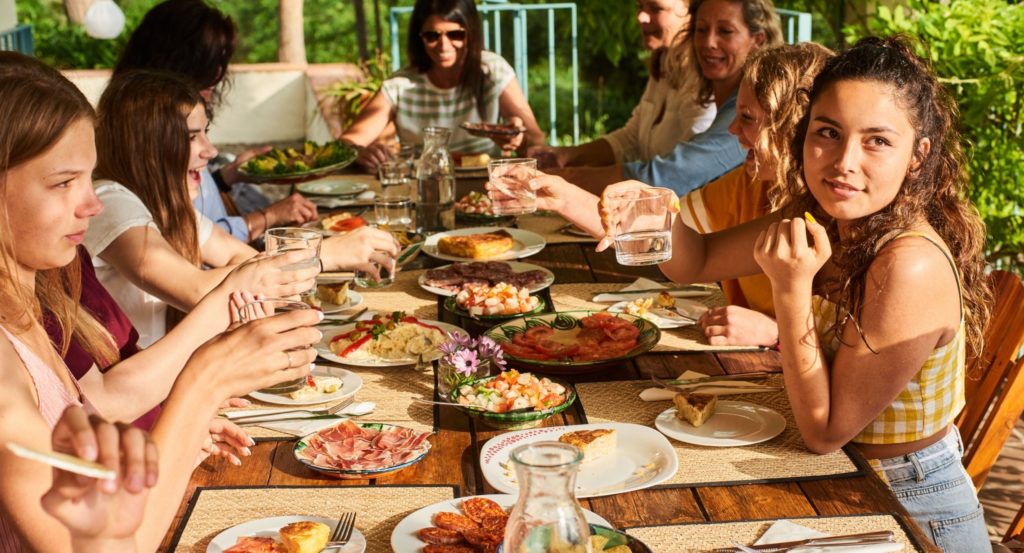
How to Talk About Your Healthy Eating With People Who Don’t Get It

Get access to everything we publish when you
sign up for Outside+.
The pandemic gave many people an opportunity to rethink priorities in life. For some, that meant making dietary changes, such as avoiding gluten, dairy, sugar, alcohol or animal products. Unfortunately, loved ones aren’t always understanding and may inadvertently pressure you to indulge in something you don’t want to.
When planning to visit with friends or family, you might be dreading having to explain that yes, you really are a vegan, and that means that no, you won’t be eating eggs and toast with butter for breakfast. You also might be wondering how you’ll avoid pressure to eat foods you know will end up making you feel lousy. Research shows that it becomes more challenging to keep up healthy eating habits when we eat outside the house.
But it is possible to maintain your healthy eating pattern even when socializing.
“It’s OK if you loved something as a child but you no longer do,” says Mary Pritchard, Ph.D., president of the Rocky Mountain Psychological Association. “Get clear about your own boundaries. What’s your goal? Is it to not gain weight? Is it to maintain your current diet? Only you know that.”
Once you’re clear on what’s important to you, it becomes easier to set limits and talk about your healthy eating pattern.
“Go into it with the mindset that I’m really excited to see my loved ones but [that] I value myself and need to take care of myself,” Pritchard says.
1. Communicate Before You Arrive
Once you are clear about your goals and limits, take some time to think about what might trigger you so you can strategize. If you know Nanna’s special cookies will be tempting, have a plan before you get to Nanna’s house.
“You’re more likely to enforce your boundaries when you’ve given it a fair amount of thought,” Pritchard says.
Maybe you’ll decide to have one of her delicious cookies and then be done — or maybe you won’t want any.
If you feel comfortable, you can tell Nanna ahead of time that you can’t indulge in her cookies this year. It shows you value her time so she doesn’t buy ingredients and make something you don’t want to eat.
You also can offer her an alternative. Say something like, “What I’d really love is to play cards with you like we used to.”
When giving a host notice about your restrictions, you also can offer to bring something that you can eat. That helps take pressure off the host. For example, “I’d really love to come to your party. I am vegan, but you don’t have to go to any trouble for me. I’ll make a vegan dish to share.”
2. Prepare Some Responses
If you’re expecting to hear pressure like, “It’s the holidays. Just have one!” It might be helpful to go in armed with responses.
“The most powerful is ‘no thank you,’ says dietitian McKel Kooienga, MS, RD, LDN. “But there are so many variations depending on your unique situation and who is involved.”
You also can talk about your healthy eating pattern by saying the following:
- I won’t sleep well if I have a glass of wine.
- I want to enjoy the holiday without feeling sick, so I need to avoid gluten.
- No pie for me, thank you. I’m going to step outside for some fresh air. Care to join me?
- I’m committed to not eating animal products, but those carrots look fantastic.
- Thank you so much for offering. I’m really full right now, but would it be OK if I took some for later?
“It may be helpful to write that down in the notes section of your phone so you can do a mental refresh when heading to a gathering,” Kooienga suggests.
3. Head Off the Conversation
Of course, you don’t owe anyone an explanation. You can firmly say, “I’d rather not talk about it,” if pressed.
You also can avoid talking about your healthy eating pattern with a decoy. If you want only one drink or one cookie, you can savor it. That way, everyone will see you with something in your hand and they won’t push you to have more. If you’re avoiding alcohol, you can carry around a wine glass of water.
You also might suggest connecting in nonfood ways, such as a group activity (a stroll around the neighborhood or a game of kickball) or arrange for the group to volunteer together.
“There are so many beautiful traditions that you can create to spend quality time with your loved ones that don’t have to be centered around food,” Pritchard says.
4. Invite Connection
Sometimes people pressure because they feel left out, so look for ways to include loved ones that feel right to you.
“Inviting them along helps them feel included,” Pritchard says. “It helps them to not take it personally that you’ve changed some things in your life and you still want them to be involved.”
But if your travel workout, for example, is your treasured alone time, keep it that way. Simply state that you’re going for a run and you’ll be back in 30. Especially after the difficult years many people have had, self-care is important. It’s OK to stand firm on what you need to do for you, Pritchard says.
Published at Tue, 22 Feb 2022 10:46:21 -0800






